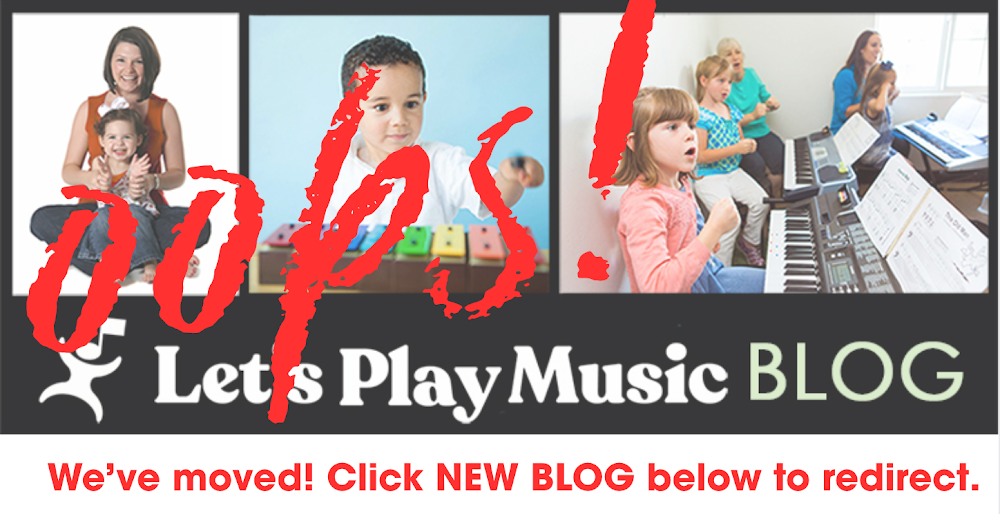Does your child have a favorite song, bedtime story, or movie he requests over and over? As adults, we are constantly seeking new stimulation, while children often crave just the opposite.
Repeating activities helps neural pathways develop to create long-term memories. Repetition gives kids a sense of power, accomplishment, and belonging, so it's no surprise they crave repetition.
It's true in music class, too. When we play a new game in music class, there is often some trepidation as everybody wonders how it's going to work. The next time we play, students are more at ease. They know with confidence, "I belong here, I know what happens next, I know what we do in this game, and I am a success in this class."
Layered Repetition
Large doses of learning are squeezed into Let's Play Music classes by layering content. Yes, we may sing the same song for seven classes in a row, but each time, as the students become more proficient, we add new elements.
Students get the repetition they need for mastery and confidence, and teachers have a sneaky way to introduce new material in each and every class.
Below are some possibilities that your teacher may focus on over the weeks, all within one song. Want to help us get the most from class time? Listen to the music at home so your child is already familiar with the song and lyrics before class...your teacher doesn't want to spend much time on that.
- Notice the lyrics, what do they mean?
- Listen carefully to the melody, can you recognize the common melodic patterns? Can you play the melody on bells/ keyboard? Can we transcribe the melody?
- Shall we sing the entire song using just solfege and handsigns instead of lyrics? Can we transpose to another key/ multiple keys?
- Focus on the ostinato. Play it on bells/ keyboard while you sing.
- Can you hear the harmony? What chords do you hear? Identify the chord progression.
- Audiate parts of the song.
- Listen to the rhythms, can you identify the bugs?
- How does this song make you feel, how do you want to move/dance? What words describe the type of sound or style of playing?
- Notice the format of the song- do sections or phrases repeat? How are the sections different?
- etc.
The Rule of Seven
This is why, in music class, we will also present several songs or games for each concept covered (common melodic pattern, common rhythmic pattern, minor tonality songs, common chord progressions, legato vs. staccato, etc.) Experiencing each concept in multiple, slightly different musical examples gives students a chance to better recognize and isolate the element.
Spaced Repetition & Memory
When we learn a new bit of information on Day 0, we all start to forget the information right away. It's a bummer, but that's just how the brain works. Our brains need cues to get the message, "hey, this stuff is worth remembering."
The forgetting curve looks like an exponential decay curve.
Each time we review what we know (and start to forget again right away), the decay curve is a little bit flatter. Each time we can allow longer periods between review, and we can remember just a little bit longer before we start to forget.
The trick for optimizing learning is to plan repetition of activities and information so that the reviews coincide with the intervals of time when students are starting to forget their facts. With organized intervals of repetition, we can study smarter, not longer.
That's why we sing a new Let's Play Music song or game in every class, several times, when it is first presented. Then it comes back (less frequently) for us to review and sing.
Remember Every Song
If you want to study smart, try creating your own spaced repetition learning: review pieces of information that you are retaining well less often than pieces that you are not remembering well.
Here's quick piano example: Choose the piano songs you want to review. How about every song I have memorized. Attempt to play through the songs. Based on how accurately you can remember the song, decide if you will review it again tomorrow, next week, next month, in 4 months, or next year.
As part of your routine, each time you play piano, include some work on a new piece you are trying to memorize and include a play-through, from your schedule of a piece that you already know. If your list is short and you're having fun, you might play more songs than are on your list (playing memorized songs is really fun.)
The importance of the list is to remind you of your songs- if you wait too long, you'll forget what you worked hard to memorize in the first place.
Remember, the goal is to practice again just as you are about to forget, and that happens at increasing intervals each time. By making it part of your routine to play through one memorized song (it's fun-you won't mind), you'll retain every song you've ever memorized, forever!
Have fun!
-Gina Weibel, M.S.
Let's Play Music Teacher
























